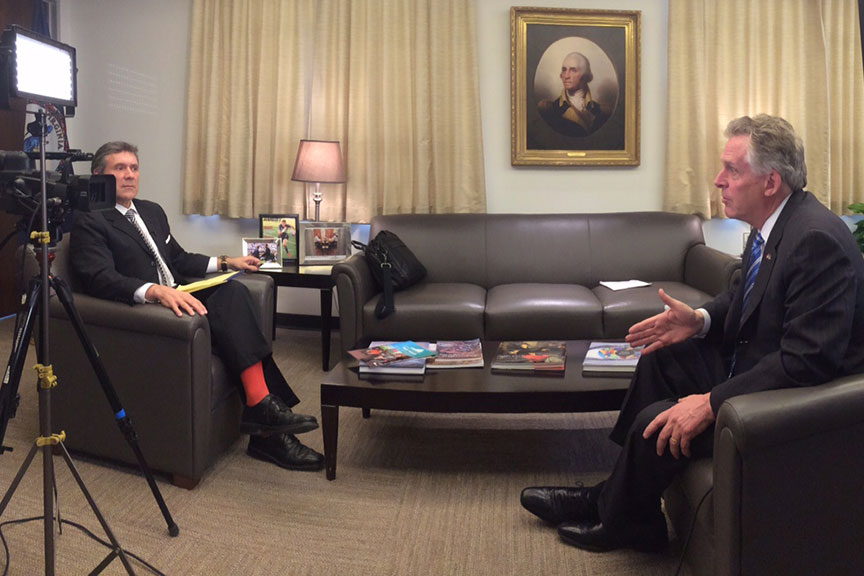This semester, the University of Virginia is starting a new initiative to promote and study the vital intersection between media and democracy. The new Center for Media and Citizenship’s mission is to broaden the understanding of civic engagement amidst the changing media environment.
“The University has never had a journalism school, department or major, and yet we have produced thousands of successful journalists, some of whom are among the most well-known in the world,” Robertson Professor of Media Studies Siva Vaidhyanathan said. “That happened because having a rich and broad liberal arts mind is the best possible training to be a journalist. Still, we didn’t want to rest just on that.”
In an age of rapid shifts in communications and journalism, the University is finding new ways to engage in the evolving media landscape and research its role in society. The Center for Media and Citizenship will go beyond the tenets of successful journalistic practices and look into the underlying values that support an informed citizenry.
“We’re asking, ‘What sources of information should citizens have?’ ‘What should be the markers of credibility?’ ‘What platforms of conversation are essential to making sure that the republic can function in the 21st century?’” — Siva Vaidhyanathan, Robertson Professor of Media Studies
In addition to sponsoring a roster of new media studies classes, the center is also launching its own television, radio and podcast shows, and will begin a speaker series in the fall.
“We’re creating a framework where we can connect some really important dots and sponsor a national conversation about the relationship between media, democracy and citizenship,” media studies lecturer and local journalist Coy Barefoot said. “That, I think, is the most Jeffersonian thing that we could do here at UVA and what makes it so exciting.”
Barefoot and Vaidhyanathan are working together to build the center, with Vaidhyanathan serving as the founding executive director and Barefoot as the in-house producer and editor. As they plan for the future, both educators hope to steer the conversation beyond the frequent questions about the fate of traditional journalism.
“That’s what journalism schools are already doing and if anyone has an answer, then more power to them,” Vaidhyanathan said.
“We wanted to start with first principles instead. We’re asking, ‘What sources of information should citizens have?’ ‘What should be the markers of credibility?’ ‘What platforms of conversation are essential to making sure that the republic can function in the 21st century?’”
The center has begun addressing those questions with its first class this semester, “Media and Documentary History,” taught by Barefoot. The course addresses the way people design, create and share stories about the past on different media platforms. While teaching, Barefoot has also begun production on “The Coy Barefoot Program,” the center’s weekly public affairs television program that will air on local stations.
“Coy has been a notable journalist in Charlottesville for many years and this is going to be a very local show,” Vaidhyanathan said. “It’s going to focus on the University, Charlottesville and Central Virginia, and it’s going to have leading figures and community activists talk about ways of improving this area.”
“Each one of the media organizations that we’re working with is committed to creating opportunities for students and getting them inside the newsroom so they can see how things work.” — Coy Barefoot, producer and editor
Students will have the opportunity to work as production assistants on the show starting in the fall. They’ll get behind the camera and start learning the finer points of production and editing. In the meantime, the center already has a strong lineup for its first few episodes.
The inaugural episode will air Sunday and feature an interview with Virginia Gov. Terry McAuliffe. Each episode will air first on Sunday morning at 10 a.m. on Charlottesville’s WVAW, an ABC affiliate, and then again on Thursday evenings on WVPT in Harrisonburg, a public broadcasting station.
“Each one of the media organizations that we’re working with is committed to creating opportunities for students and getting them inside the newsroom so they can see how things work,” Barefoot said.
In addition to the access they’ll get to local media through the television show, Barefoot and Vaidhyanathan also plan to expand the center’s media partnerships on a national level through their planned radio show and podcasts.
“We’re going to leverage our networks to put students in helpful places,” Vaidhyanathan said. “Eventually, we want to formalize a lot of these relationships. We would love to endow a larger internship program down the road.”
Barefoot also plans for students to take a hands-on role in the upcoming speaker series. Each speaker will be asked to participate in three events: a live discussion on Grounds, a long-form video interview with Barefoot and a brown-bag informal lunch with students. Undergraduates will be tasked with documenting all these events, particularly the discussion and interview portions.
“The students are going to be the ones on those cameras, shooting and editing,” Barefoot said.
The speaker’s discussion will be turned into a second television show that students will produce for the center, while Barefoot’s interviews will give them a chance to practice their documentary and media archiving skills. Those invited to speak in the fall will all be UVA alumni who now work as journalists.
In the meantime, the center is gearing up for the first few episodes of “The Coy Barefoot Program.” Barefoot’s interview with McAuliffe on Sunday will be followed by episodes featuring Charlottesville Police Chief Timothy Longo and UVA President Teresa A. Sullivan.
“We are going to continue to produce outstanding working journalists at the University, but with the center, we’re now going to be in a position to lead the discussion of the relationship between journalism and citizenship,” Vaidhyanathan said.
Media Contact
Article Information
January 28, 2016
/content/new-center-explore-medias-role-democracy-offer-practical-experience

